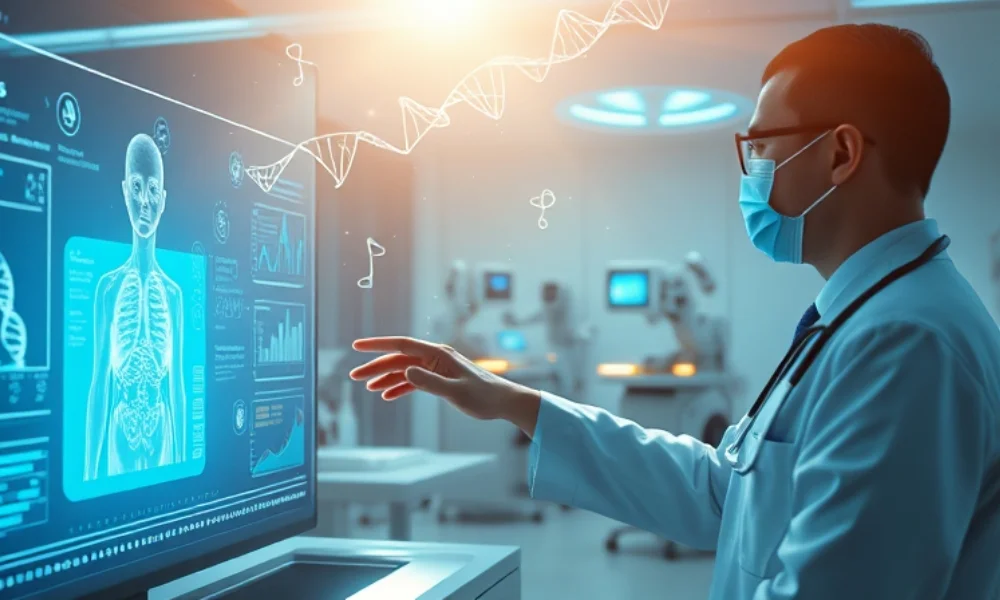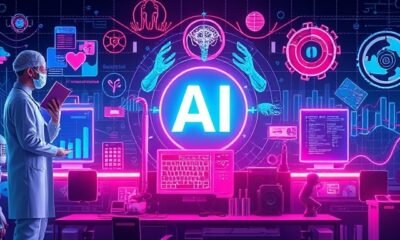Artificial Intelligence
Personalized Medicine Using AI: Transforming Healthcare, One Patient at a Time
AI-powered personalized medicine is revolutionizing healthcare by transforming “one size fits all” into tailored treatments based on genetics, lifestyle, and more. Explore more…

Application of artificial intelligence for personalized medicine using AI has transformed healthcare delivery by delivering customized treatments that respect genetic and environmental and lifestyle conditions of individual patients. The approach delivers distinct treatment solutions to each patient by avoiding standard practices that fail to meet individual requirements.
Definition:
What is Personalized Medicine?
Personalized medicine (or precision medicine) provides specific medical care designs which match individual patient needs. Doctors now build individualized treatment plans by analyzing patient genetic makeup together with lifestyle elements and environmental factors.
How does it differ from conventional treatments?
The current medical approach adopts a method of guesswork as its main principle. The traditional method which proved its worth for extended periods neglects to recognize patient-specific characteristics. Data-driven techniques enable personalized medicine to develop treatments which become specific for individual patients. Such medical strategy produces more powerful healthcare solutions and operates with increased efficiency.
How AI is Transforming Personalized Medicine?
Development of personalized medicine strongly depends on artificial intelligence systems. Through the use of AI algorithms doctors can analyze many genetic and clinical data points within brief time periods. The technique generates precise forecasts about how bodies react to various forms of treatment.
Precision Dosing:
- Custom Dosages: The optimal drug dosage emerges through precision dosing which relies on individual patient data.
- Reduced Side Effects: The specific nature of dosage adjustments reduces the potential for safe medication delivery problems by creating appropriate treatment ranges.
- Enhanced Effectiveness: The technique provides treatments at their best effective level while eliminating improbable health hazards.
Early Disease Detection:
- Proactive Monitoring: Through personal genetic markers personalized medicine can identify diseases before patients develop noticeable symptoms.
- Improved Outcomes: Early detection of conditions makes it possible to start treatment at the right time which can stop medical complications from advancing.
- Cost Savings: The detection of health problems at an early stage prevents future medical costs associated with advanced conditions.
Reduced Adverse Reactions:
- Patient-Specific Treatment: Genetic insights reveal which drugs would create unacceptable side effects for specific patients.
- Safer Medications: Patient safety together with improved treatment results occurs through reduced adverse reaction risks.
- Higher Confidence: Physicians feel confident about prescribing medications because they know which drugs will work best with individual patients.
Predictive Risk Assessment:
- Identifying Vulnerabilities: The analysis of genetic makeup detects natural susceptibilities that lead to specific health problems.
- Preventative Strategies: Healthcare providers can prevent risks through medical treatments combined with early life-style changes.
- Empowered Decisions: Patients together with their doctors gain the ability to select healthcare options based on better information.
Faster Treatment Optimization:
- Time Efficiency: The quick identification process of personalized medicine allows doctors to discover the most suitable treatments for their patients.
- Eliminates Trial-and-Error: The process of testing multiple treatments becomes unnecessary which leads to improved care efficiency.
- Early Relief: People who undergo personalized care achieve speedier symptom relief and faster restoration of health.
Improved Patient Compliance:
- Personal Relevance: When treatments are personalized patients show better adherence to therapy.
- Fewer Side Effects: Treatment sustainability for patients improves when the number of adverse reactions decreases.
- Clear Guidance: Personalized plans deliver healthcare instructions that are direct and easy to execute.
Cost-Effective Long-Term Care:
- Preventative Approach: Preventative care efforts help decrease the need for costly treatments that manage chronic diseases.
- Efficient Resource Use: Healthcare systems save resources by spending them on treatments that deliver desired results.
- Better Quality of Life: The cost savings to patients and medical institutions emerge when treatments yield better results.
Benefits: Both patients and medical practitioners achieve better outcomes because treatment strategies fit specific needs of individuals. The approach promises enhanced results and reduced side effects with faster patient recoveries.
Role of AI in Personalized Medicine:
Artificial Intelligence serves as the fundamental force that brings personalized medicine into reality. The processing of large data collections drives innovation throughout medical treatments while advancing research. But how does it work?
Through data analysis AI processes information derived from medical records and genetic data and wearable devices alongside other patient information. The system leverages this process to reveal patterns which no individual could detect independently. Through AI technology diagnostic accuracy and treatment execution become better. Artificial intelligence enables early disease detection while enabling real-time treatment adaptation which results in better patient results.
AI’s Role in Analyzing Patient Data:
Understanding hereditary diseases requires the essential application of artificial intelligence. AI algorithms use genetic historical data to detect potential health threats with exceptional precision. AI-powered testing identifies breast cancer inherited risk in individuals which enables early preventive measures.
How do environmental factors come into play?
The location where we spend our time both living and working directly impacts our health status and AI systems evaluate these environmental elements. The combination of AI tools extracts a person’s environmental connections to asthma developments and cancer onset.
Can AI understand our lifestyle choices?
Digital tools study how people manage their daily activities through diet programs and exercise patterns and sleep routines. The data provides doctors with recommendations about diabetes control diets and heart-healthy workout plans that enhance treatment outcomes.
How does AI improve disease prediction?
The superior capability of AI systems to find hidden patterns among large datasets results in the discovery of associations that escape conventional approaches. AI utilizes genetic information alongside medical histories and lifestyle data to produce disease risk predictions which include diabetes, heart disease and rare genetic conditions. Healthcare providers receive valuable warnings from predictive data which enable them to deliver proactive treatment before conditions advance.
Can AI help in early diagnosis?
Among all AI benefits in modern healthcare early diagnosis stands out as one of the most significant advantages. Image recognition algorithms display outstanding performance in X-ray and MRI and CT scan analysis to help doctors detect early signs of health conditions including cancer and fractures.
AI diagnostic tools with AI-driven processing capabilities outpace conventional approaches to deliver swift detection of important medical conditions which leads to expedited treatments resulting in better patient health outcomes.
How does AI personalize treatment plans?
Through AI technology treatment plans become personalized through the analysis of genetic data and lifestyle information along with treatment history evaluation. By machine learning algorithms AI generates suggestions regarding medication prescriptions and dosages which maximize therapeutic effectiveness for patients dealing with chronic pain as well as depression and autoimmune diseases. Through customized therapeutic methodologies we achieve better results while minimizing dangerous medication reactions.
What role does AI play in drug discovery?
The discovery of medications receives substantial acceleration thanks to Artificial Intelligence because it reduces production expenses and development durations. Machine learning models process large data sets to detect potential compounds before they predict biological system interactions.
AI technology accelerates clinical trials through its ability to identify optimal study subjects which shortens the research journey until patients gain access to new treatments. The combination of technological breakthroughs makes new medicines available more frequently and in advanced formats.
AI Technologies Powering Personalized Medicine:
AI technologies empower customized healthcare solutions, some more effectively than others:
- Machine Learning: The algorithms use patient history data to perform illness predictions. The analysis of extended medical records allows these systems to detect existing patterns.
- Natural Language Processing (NLP): Through NLP systems we can extract meaningful information from the freeform data found in doctor’s notes and patient feedback.
- Predictive Analytics: Tools use data analysis to predict health risks followed by recommending preventive steps which help patients avoid hospital visits.
- AI-Powered Drug Development: New medical treatments require extensive development periods extending over several years. By employing artificial intelligence the process of creating new drugs becomes quicker than standard medical practices allow.
- Computer Vision in Medical Imaging: Medical imaging technology advances through computer vision tools which improve both disease detection precision and diagnostic accuracy. AI software tools process medical imaging scans including X-rays, MRIs and CT scans to find irregularities which human eyes struggle to identify.
- Robotics in Surgery: AI-powered robotic surgical systems enhance both precision and flexibility and control performance beyond human reach during operations. Robotics technology enables surgeons to execute minimally invasive procedures through robotic arms which simultaneously decreases patient recovery periods and improves medical results.
- AI-Driven Virtual Health Assistants: Through AI-powered virtual health assistants patients can now interact differently with health services. These virtual health assistants can help patients manage their appointments while they send medication reminders and respond to frequently asked healthcare questions.
The combination of these technologies makes AI improve both healthcare accessibility and operational efficiency for professionals.
Case Studies: AI in Action:
Examples of medicine using AI aren’t just hypothetical – they’re happening now:
- Cancer Treatment Personalization: Tumor genetics-based AI systems forecast suitable chemotherapy drugs which patients should receive. The use of these precise therapeutic approaches produces better outcomes along with lower invasiveness.
- Diabetes Management: AI-based tools utilize individual glucose levels and habits to generate exact diet and exercise recommendations for each person.
- Cardiovascular Disease Prevention: With the help of AI algorithms healthcare professionals can examine heart patterns to forecast heart attacks before they happen.
- AI-Guided Radiology: AI-powered imaging systems use outstanding precision to detect tumors and fractures allowing radiologists to diagnose medical conditions earlier and better.
- Personalized Mental Health Therapy: AI-based platforms perform analysis of mental health patterns alongside speech and behavioral data which allows them to create personalized treatment recommendations leading to better health results.
- AI in Rare Disease Diagnosis: Through analysis of extensive medical databases AI systems detect hard-to-spot disease indicators which standard diagnostic techniques often overlook leading to improved rapid and precise medical diagnosis.
- AI-Driven Organ Transplant Matching: AI algorithms accelerate organ donation matching through precise assessment of tissue compatibility and recipient medical history along with urgency criteria resulting in shorter waiting durations and superior outcomes.
- Predicting Neurodegenerative Diseases: Right now AI models examine minimal cognitive and motor indications to detect Alzheimer’s or Parkinson’s disease while they remain in their early development phase thus facilitating prompt treatment access.
- AI in Allergy and Immunotherapy: AI-based treatment systems use individual patient immune data combined with environmental elements to create personalized allergy protocols which lead to improved treatment success.
- AI for Autoimmune Disease Treatment: Machine learning technology helps detect autoimmune disease triggers across individual patients which leads to improved precision medicine strategies and better control of their conditions.
- AI-Powered Chronic Pain Management: AI platforms use patient data combined with biometric indicators to generate customized pain treatment recommendations which span medicinal interventions and therapeutic approaches.
- AI in Post-Surgical Recovery Optimization: Artificial intelligence analyzes live patient information to improve recovery times through optimal treatment scheduling while spotting early health problems and developing better pain control approaches.
- AI for Precision Nutrition: AI combines genetic profiles with lifestyle factors and health objectives to develop full-scale dietary instructions that provide both sustainability and highly tailored feeding plans.
- AI-Enhanced Rehabilitation Programs: Therapy programs that use artificial intelligence technology dynamically adjust their content to match user progress which delivers personalized exercises and feedback to help people recover faster from injuries or surgeries.
- AI in Pediatric Disease Management: AI systems now enhance pediatric care through analysis of symptoms combined with medical histories and growth patterns to help physicians provide earlier and more precise diagnosis and treatment for children.
Challenges & Ethical Concerns:
While the promise of AI in healthcare is exciting, there are barriers we can’t ignore
Can data remain private?
Patient data requires absolute security as well as privacy protection at all times. Information security systems need to be developed as a top priority.
How can algorithm bias be addressed?
Computer systems duplicate the training data they receive. A lack of diversity in datasets creates opportunities for bias to develop which results in mistaken predictions about specific groups.
Should doctors fear AI?
AI functions to assist healthcare providers instead of functioning as their replacement because it gives them more power. Doctors should team up with AI systems to deliver optimal patient care through data analysis capabilities of technology platforms.
Is AI decision-making always reliable?
AI decision systems highly depend on three factors: the system design and the data quality and the chosen algorithms. Vast information processing with pattern recognition is possible for AI but unreliable outcomes occur from biased training data or insufficient contextual understanding.
Can AI replace human empathy in healthcare?
AI possesses remarkable data analytical abilities yet it falls short when it comes to emotional understanding and maintaining personalized interactions with humans. AI tools help healthcare providers with diagnosis functions while running patient management systems but they lack the human ability to deliver medical empathy or personal comfort to patients. The development of patient trust depends on human connection because machines currently cannot replicate this essential element.
What are the risks of over-reliance on AI?
Heavy dependence on AI systems will make healthcare professionals less attentive while simultaneously diminishing their ability to think critically. Patient safety becomes compromised when systems either cease to function properly or deliver faulty information. The application of AI healthcare technology must serve as an aide for human judgment instead of replacing the skills and knowledge of healthcare professionals.
How can we prevent misuse of AI in medicine?
The prevention of AI misuse in medicine starts from creating strong ethical directives along with stringent regulatory frameworks. AI systems must operate transparently throughout their development phase until deployment to guarantee they serve exclusively patient benefits.
Healthcare professionals and developers need ethical training about technology use because proper education helps prevent harmful technology intentions and negative side effects.
Does AI increase healthcare accessibility for all?
AI technology can expand medical accessibility through automated processing systems which support remote healthcare analysis. The combination of telemedicine with AI creates platforms which extend healthcare solutions to all areas regardless of service availability. The full realization of these benefits needs digital infrastructure alongside equitable access to technology to reach everyone.
How do we handle errors in AI predictions?
AI prediction errors require immediate attention through a defined evaluation system. AI systems need regular audits and should receive updated training data while human oversight should be established to reduce errors. Patient safety and trust depend on transparent and accountable processes which guide mistake corrections.
Can AI widen the healthcare gap between developed and developing countries?
The healthcare gap may expand when developing countries fail to obtain necessary technologies alongside inadequate funding and insufficient expertise for AI implementation. The absence of equal healthcare innovation distribution requires international partnerships together with budget-friendly AI solutions and purpose-made programs to achieve worldwide access.
What are the financial challenges of implementing AI in healthcare?
The deployment of AI in healthcare requires organizations to invest in three major areas: infrastructure construction, technological acquisition and personnel training programs. The implementation costs run high for smaller healthcare facilities and underresourced healthcare systems. Healthcare providers must achieve a proper equilibrium between implementing innovative and budget-friendly AI to avoid excessive financial strain from adoption.
Future of AI in Personalized Medicine:
Advancement of personal care treatment will heavily depend on wearable technologies and in-the-moment health tracking. Artificial intelligence systems may detect health issues early before people develop any visible symptoms to doctors. The future of medicine will witness breakthroughs in gene-editing and surgeries which will benefit from Artificial Intelligence advancements.
How will wearable tech evolve patient care?
Wearable devices like Apple Watches and Fitbit collect important health information which helps doctors provide out-of-office treatment.
Can AI predict diseases before symptoms appear?
The analysis of vast genetic and environmental and lifestyle datasets through AI systems shows promise for transforming early disease diagnosis. By using machine learning algorithms healthcare providers can detect early signs that develop ahead of visible diseases.
Predictive healthcare models process historical data with genomic information to detect early warnings of diseases such as diabetes and cancer which triggers early prevention strategies to enhance medical results.
How will AI enhance robotic surgeries?
The implementation of artificial intelligence within robotic surgical platforms enables unprecedented surgical precision together with unmatched operational efficiency. Real-time patient data analysis powers critical clinical insights for surgeons to enhance their procedural decision-making capabilities.
Advanced algorithmic systems would implement predictive capabilities to serve surgeons’ requirements while reducing mistakes and transforming unpredicted situations into better surgical results. Through supervision AI-enhanced robots will eventually progress to handle autonomous surgical tasks while maintaining meticulous accuracy in complex operations.
What role will AI play in gene editing?
Through AI technology researchers gain more precise target identification functions while minimizing unintended genetic alterations. Genome editing tools such as CRISPR benefit from AI algorithmic capabilities that locate exact genomic positions for both corrective and enhancing genetic modifications.
Research speed acceleration and reduced genetic treatment risks through precision engineering lead to new possibilities in personalized medicine solutions for untreatable conditions.
Can AI improve mental health treatment?
Mental health care receives transformative improvements through AI-driven tools that include chatbots alongside mood-detection systems which deliver immediate accessible support. Machine algorithms examine speech variations together with facial reactions and vocal pitch changes to recognize symptoms of depression or anxiety and other mental disorders. The collected data allows for creating individualized therapeutic approaches that combine personalized mindfulness training with human counselor access.
How will AI revolutionize telemedicine?
AI technology transforms telemedicine through advanced virtual consultation systems which deliver both enhanced performance and reliability. Through video call analysis intelligent systems display diagnosis possibilities alongside treatment recommendations based on patient histories and symptoms and detected physical manifestations. AI virtual assistants enhance operational efficiency by handling administrative work which enables medical professionals to provide better care to their patients.
Will AI make personalized medicine more affordable?
AI technology has the power to make medicine accessible to everyone through cost reduction and process simplification. Modern machine learning systems use patient genetic details combined with lifestyle information alongside medical records to predict optimal treatment options. The integration of AI technology allows both faster drug development and economical therapeutic approach identification which minimizes financial obstacles to personalize medicine access.
How will AI-driven drug discovery evolve?
Artificial Intelligence drives advances in drug discovery through its acceleration of expensive and prolonged research activities. The analysis of extensive biomedical databases by algorithms enables them to identify possible compounds that could treat particular health conditions.
The combination of molecular interaction models with clinical trial simulations through AI minimizes traditional experimentation methods while accelerating drug discovery and regulatory clearance.
Can AI create fully autonomous diagnostic systems?
Today’s AI diagnostic tools demonstrate exceptional performance in disease identification for cancers alongside heart diseases and neurological disorders. These systems utilize integrated patient history and imaging and laboratory results to perform autonomous risk assessment operations and suggest additional tests which surpass human diagnostic abilities.
Researchers work to develop advanced autonomous diagnostic systems which require almost no human involvement to achieve quick accessible health examinations for all populations.
What impact will AI have on elderly care?
AI technologies are revolutionizing elderly care through their ability to enhance observation methods and offer assistance. Monitoring devices within smart home technology use sensors along with AI capabilities to record senior citizens’ movement patterns while recognizing their falls and tracking their medical statistics to facilitate early medical assistance.
Through AI-powered companion robots older adults receive emotional support and assistance with daily tasks which combats isolation while encouraging independent living.
How will AI transform emergency medical response?
The emergency medicine field stands ready for a revolution through the optimization of response times along with resource allocation. Through real-time analysis of emergency call data along with patient monitor information intelligent systems help first responders make decisions about case prioritization. AI algorithms predict traffic flow patterns to guide ambulances toward the most efficient routes thus guaranteeing quick access to critical patients.
Can AI enhance regenerative medicine and tissue engineering?
The advancement of regenerative medicine receives significant acceleration from AI through its assistance in creating synthetic organs and tissues. Artificial intelligence evaluates biological data to develop tissue scaffolds and recommends the most beneficial cell regeneration environmental factors. Through this approach healthcare professionals can develop dependable treatment solutions that specifically meet the needs of organ transplant patients and patients requiring specialized injury care.
Will AI enable real-time personalized treatment adjustments?
Artificial Intelligence systems provide ongoing patient tracking services to recommend instant modifications of treatment protocols. Medical devices which incorporate artificial intelligence algorithms enable healthcare providers to monitor patient vital signs and medicine effects allowing instant adjustments of treatment plans. By using this dynamic treatment strategy healthcare professionals can achieve better patient outcomes while maintaining treatment effectiveness and reducing adverse effects.
How will AI shape the future of preventive healthcare?
Future of preventive healthcare looks promising because AI delivers powerful prediction abilities. AI systems combine genetic and lifestyle data to identify people who face increased risks of developing chronic diseases or infections.
Individual healthcare recommendations for diet plans and exercise routines coupled with early medical screenings lower health system costs and promote personal wellness throughout life. AI systems will give people the ability to manage their wellness issues before health problems develop.
Conclusion
Healthcare experiences a transformation through artificial intelligence-enabled personalized medicine which delivers precise treatments along with optimized patient care. What effects do you predict this new approach will have on medical care of the future? You have any thoughts about the use of artificial intelligence in creating individualized medical treatments? Feel free to add your thoughts through comments.
-

 Artificial Intelligence8 months ago
Artificial Intelligence8 months agoWhat is Artificial Intelligence? A Comprehensive Guide for Businesses and Enthusiasts
-

 Artificial Intelligence6 months ago
Artificial Intelligence6 months agoHow to Use Grok AI: A Complete Guide
-

 Artificial Intelligence8 months ago
Artificial Intelligence8 months agoUnlocking the Power of Artificial Intelligence Tools
-

 Artificial Intelligence7 months ago
Artificial Intelligence7 months agoWhat is DeepSeek? Revolutionizing AI with Cutting-Edge Solutions
-

 Artificial Intelligence3 months ago
Artificial Intelligence3 months agoAI Technologies in Warehouse Automation:
-

 Artificial Intelligence4 months ago
Artificial Intelligence4 months agoMeta’s AI Push: The Standalone Assistant App Set to Rival ChatGPT
-

 Artificial Intelligence3 months ago
Artificial Intelligence3 months agoHow Artificial Intelligence is Revolutionizing Logistics:
-

 Artificial Intelligence3 months ago
Artificial Intelligence3 months agoPredictive Analytics for Demand Forecasting:


